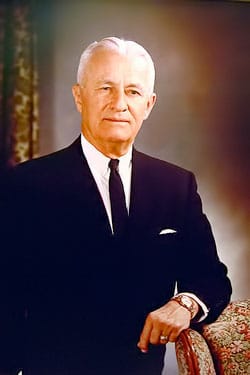From small beginnings to mammoth contributions
 Philip S. Miller
Philip S. Miller
By Joe Gschwendtner; historical information provided by the Douglas County History Research Center
I was raised the son of a butcher. My father worked his last job in Castle Rock. The comparison ends quickly though, as I am a regular Joe. Philip S. Miller’s father (Philip Sr.)was also a butcher, while his son unarguably became Douglas County’s most distinguished and generous citizen. At his death, Philip S. Miller had accumulated more than $30 million and beyond sizable cash bequests, the balance of his fortune was left in trust for community and charitable organizations.
The family had Austrian and German immigrant roots. Living in Peoria, Philip Sr. (aka “Butch”) moved west to mitigate his wife Lena’s suffering from tuberculosis. Upon arriving Denver in 1906, Butch, a saloon keeper and butcher, settled at 1119 Champa (destroyed in 1970). His sons enrolled at the Corona School and he opened up a meat market in Cherry Creek North. There, his son Philip learned his trade.
The family migrated to Elizabeth raising cattle and pigs for slaughter and also opened a small butcher store there. By spring of 1919, Philip encountered Jerry Stewart of Falcon, the love of his life, at a Parker high school dance. By November they were married.
On his own, Philip partnered to open two more meat markets in Kiowa and Castle Rock. When a partner later wanted out, Philip tried unsuccessfully to get a $2,000 loan from an Elizabeth bank. Turned down, he relocated to Castle Rock on 324 Wilcox to be closer to that store (now part of the B & B Café).
His success was almost instant. He worked at the heavy labor, while wife Jerry ground hamburger, made sausage, and served customers. An early advertisement read “Meat eaters are the folks who do big things in this world.” All his butchering and slaughtering were done at a facility on Lake Gulch Road.
During the Great Depression and as a member of town council, Philip took bold positions that brought electricity and a sewer system to Castle Rock. The excess capacity from the Louviers dynamite plant was brought via poles that cost the city $5 per pole on fallow land and $10 per pole on cultivated fields. The sewer system cost $24,000 to build.
The Depression left Castle Rock without a bank for many years and Philip never forgot the critical need for small town banking. In 1938, local businessmen approached him to open a state chartered bank, the Bank of Douglas County. With investment capital of $25,000, the bank opened its doors in 1939. Until he retired, Philip could be found always willing to talk to his customers for any reason.
To the end, Philip and Jerry were modest, humble folk and their love was true and deep. Until she passed away in 1987, they called each other “mommy” and “poppy.” Philip lived until 1999.
Philip’s perpetual charitable trust directs 60 percent of the annual income to city/county functions with the remainder directed to Denver Children’s Hospital and the Shriner’s Hospital for crippled children. He and Jerry rest peacefully today in Cedar Hill Cemetery on Wolfensberger Road.